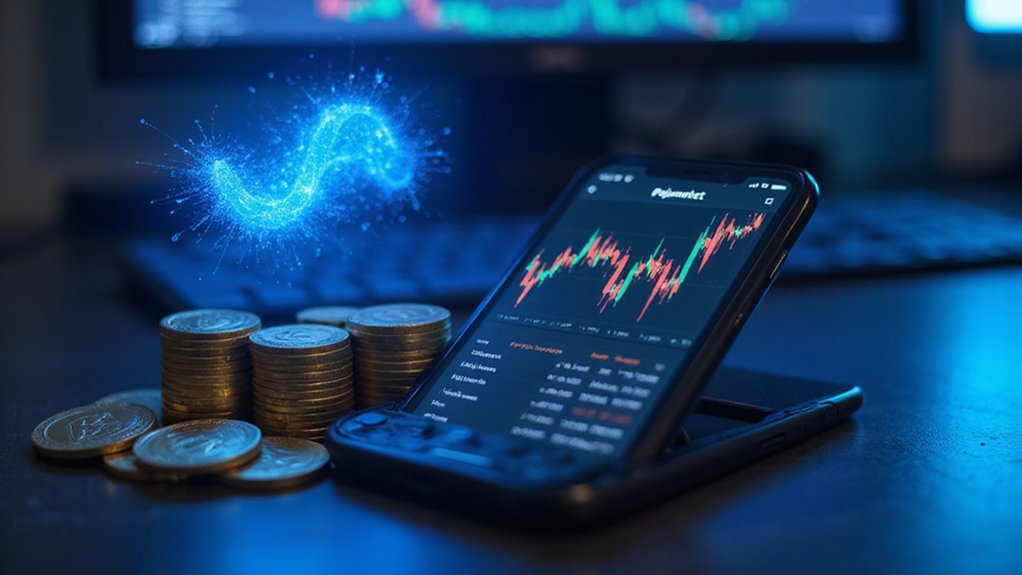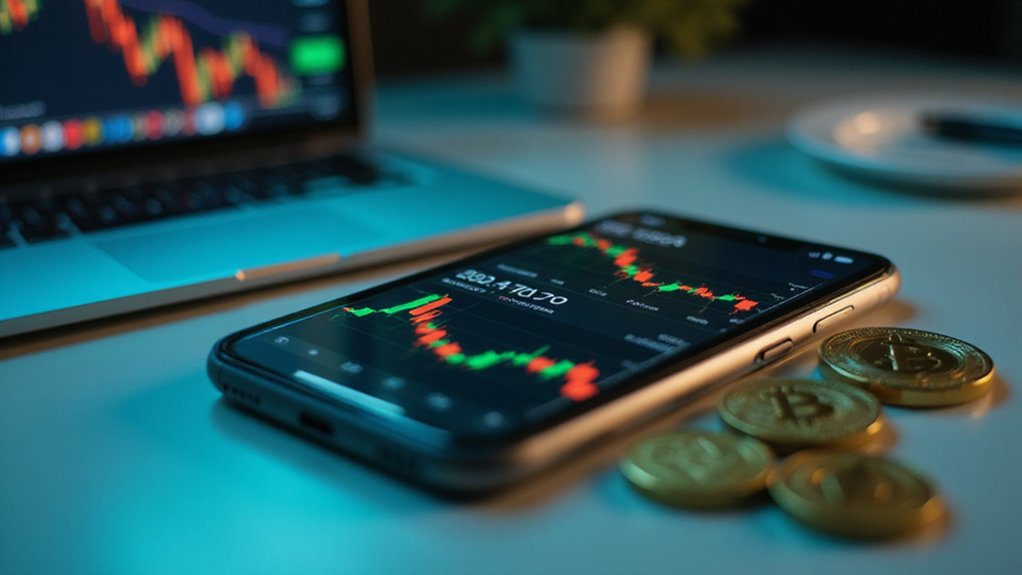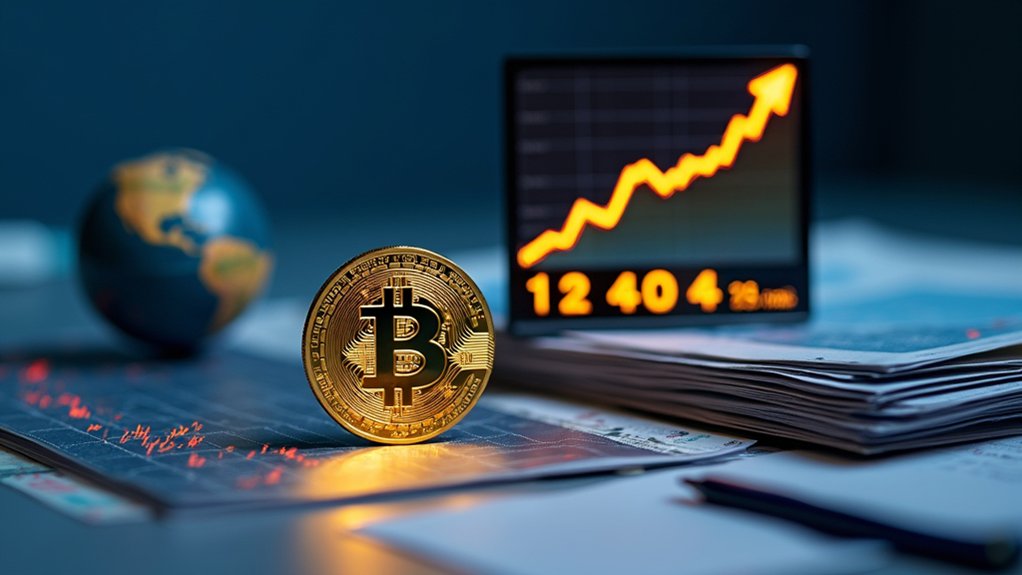Polymarket functions as a decentralized prediction market where users trade outcome shares priced between $0.01 and $1.00, with prices reflecting market-estimated probabilities. Traders purchase shares in binary events—political outcomes, financial indicators, sports—and profit when correct predictions resolve at $1.00 per share. The platform’s blockchain infrastructure eliminates intermediaries while its financial incentives produce remarkably accurate forecasts through the collective wisdom of participants with actual skin in the game. The mechanics reward both research acumen and timing intuition.

When traditional financial markets seem increasingly detached from reality, prediction platforms like Polymarket offer an intriguing alternative—one where putting your money where your mouth is becomes quite literal.
This decentralized platform, built on blockchain technology, creates a transparent ecosystem where users trade not on stocks or commodities but on the outcomes of real-world events ranging from presidential elections to Bitcoin price movements.
The mechanics are elegantly straightforward: users purchase outcome shares priced between $0.01 and $1.00, with prices reflecting current market-assessed probabilities.
In prediction markets, price isn’t just a number—it’s collective intelligence quantified through financial commitment.
A $0.75 share on “Biden wins Pennsylvania” indicates approximately 75% market confidence in that outcome.
Should that prediction materialize, each share redeems at $1.00 (netting a tidy 33% return); incorrect predictions render shares worthless—a binary proposition with clarity rarely seen in traditional markets.
What makes Polymarket particularly fascinating is its remarkable forecasting accuracy.
The platform harnesses collective wisdom through financial incentives, effectively converting speculative opinions into skin-in-the-game predictions.
Users conduct thorough research before placing bets, creating a market efficiency that often outperforms traditional polling methods and expert forecasts.
When opinions carry financial consequences, quality of information tends to improve dramatically.
Unlike conventional betting platforms, Polymarket’s blockchain infrastructure creates a trustless environment where transactions remain secure, transparent, and resistant to centralized manipulation.
Users can trade shares continuously until market resolution, with prices adjusting dynamically as new information emerges or sentiment shifts.
The platform operates as a Web3 application with no KYC requirements, allowing users to participate through non-custodial wallets.
These wallets provide full ownership of digital assets while enabling direct interaction with the platform’s smart contracts.
The applications extend far beyond mere speculation.
Traders participate in markets spanning political outcomes, financial indicators, sports events, and entertainment trends.
This diversification allows for portfolio-like approaches to prediction trading while generating remarkably accurate forecasting data as a byproduct.
For traders seeking alpha in unconventional corners, Polymarket represents a curious intersection of gambling mechanics, prediction science, and financial markets—where being right isn’t just intellectually satisfying but financially rewarding.
The 2024 U.S. presidential election became the platform’s most active market with an astonishing $3.3 billion wagered by participants seeking to profit from their political forecasts.
In a world awash with opinions, it creates an ecosystem where accuracy carries tangible value and collective intelligence finds expression through price discovery.
Frequently Asked Questions
Is Polymarket Legal in My Country?
Polymarket’s legality depends entirely on your specific location, as the platform faces a patchwork of international restrictions.
The prediction market is explicitly banned in the US, UK, France, Singapore, Belgium, Thailand, and numerous other countries (including all sanctioned territories).
Without knowing your country of residence, it’s impossible to provide a definitive answer—though regulatory bodies worldwide increasingly classify such platforms as gambling operations, subjecting them to corresponding legal frameworks.
How Are Profits Taxed on Polymarket?
Polymarket profits face a taxing labyrinth that varies by jurisdiction (ah, the joys of regulatory arbitrage).
In the US, they’re treated as ordinary income—essentially gambling winnings—requiring reporting regardless of whether you receive those ever-elusive 1099 forms.
Canadians might enjoy the half-taxable capital gains treatment for casual use, while systematic traders face full business income taxation.
International users inhabit a regulatory gray zone where local gambling and financial regulations may apply.
Meticulous record-keeping remains non-negotiable everywhere.
Can Market Creators Manipulate Outcomes?
Market creators at Polymarket cannot directly manipulate outcomes, as markets are created collaboratively between the platform team and community rather than by individual users.
However, concerns about wash trading—artificially inflating transaction volumes—have triggered regulatory scrutiny, including FBI investigations.
The platform’s architecture incorporates mechanisms designed to counteract manipulation attempts through market forces and transparency, theoretically enabling decentralized correction of any short-term manipulative activities that might emerge in the ecosystem.
What Happens if an Event Is Canceled?
When events are canceled on Polymarket, the platform typically follows predetermined resolution protocols.
Markets may be resolved as “NO” (if the event definitively won’t occur), voided (with traders receiving refunds at initial positions), or occasionally left open if the event might be rescheduled.
During contentious resolutions, users can initiate disputes, submitting evidence during the challenge period.
The final determination—whether through platform decision or community voting—ultimately dictates how traders’ funds are distributed, sometimes yielding unexpected financial consequences for positions taken pre-cancellation.
Are There Withdrawal Limits or Fees?
Polymarket imposes no withdrawal fees or limits themselves—a welcome rarity in an industry seemingly dedicated to extracting capital at every junction.
However, users withdrawing significant sums may encounter liquidity constraints in the Uniswap v3 pool during USDC.e to USDC conversions.
External services introduce their own fiscal complications: Crypto.com demands $25 for bank transfers, while various exchanges levy fees for currency conversions.
Splitting large withdrawals into smaller tranches remains a prudent strategy for circumventing liquidity issues.









